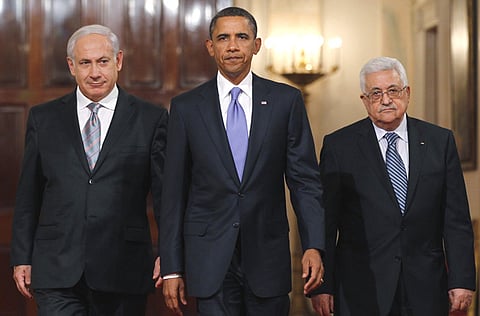Netanyahu sparks 'cautious hope' at peace talks
Israeli PM Benjamin Netanyahu calls Mahmoud Abbas his "partner in peace," urging the Palestinian leader to join him in forging a "historic compromise" to end decades of conflict

Washington: Israeli Prime Minister Benjamin Netanyahu on Wednesday called Mahmoud Abbas his "partner in peace," urging the Palestinian leader to join him in forging a "historic compromise" to end decades of conflict between their peoples.
"Our goal is to forge a secure and durable peace between Israel and the Palestinians. We do not seek a brief interlude between two wars. We do not seek a temporary respite between outbursts of terror," Netanyahu said in a speech at the White House.
Palestinian president Mahmoud Abbas met hawkish Netanyahu's conciliatory rhetoric by calling for an end to bloodshed after the latest Hamas attack in the West Bank, but also demanded a halt to Israel settlement activity.
On a day of dramatic White House diplomacy, Abbas and Netanyahu exchanged smiles and shook hands before the cameras, in imagery the White House hopes will dispel mutual suspicion and deep skepticism over Obama's initiative.
But the tough talking begins on Thursday, when the pair meet at the State Department and begin the first direct Israeli-Palestinian talks for 20 months, with issues that have thwarted previous peace efforts on the table.
Obama called on both sides not to let slip a fleeting opportunity for peace, a Palestinian state and a secure Israel within a year, as he gathered the two leaders, with King Abdullah II of Jordan and Egyptian President Hosni Mubarak.
"This moment of opportunity may not soon come again," said Obama, who met the leaders separately, and then hosted a dinner also including Secretary of State Hillary Clinton and diplomatic Quartet representative Tony Blair.
"Now is the time for leaders of courage and vision to deliver the peace that their people deserve."
The conciliatory speech from the traditionally hawkish Netanyahu laid out his vision of a different, better future for the two nations, but also spelled out Israel's fears for yet another peace move gone sour.
"We left Lebanon, we got terror. We left Gaza, we got terror. We want to ensure that territory we concede will not be turned into a third Iranian-sponsored terror enclave aimed at the heart of Israel," he said.
"That is why a defensible peace requires security arrangements that can withstand the test of time and the many challenges that are sure to confront us."
Netanyahu, speaking after the second shooting attack on Jewish settlers in as many days vowed that "terrorists" would not "block the path to peace."
The Israeli leader met early Wednesday with US President Barack Obama as Washington makes a bold bid to resume direct Israeli-Palestinian talks for the first time in 20 months.
Netanyahu, Abbas as well as Jordan's King Abdullah II and Egyptian President Hosni Mubarak were later to take part in a White House dinner hosted by Obama, who was also meeting the regional power brokers for one-to-one sessions.
All five leaders stood together at the White House to make individual statements, before retiring for the dinner also featuring Quartet diplomatic representative Tony Blair.
But Netanyahu's words were remarkable for their optimism and apparent willingness to make the concessions and take the tough steps needed to reach a peace deal.
"Every peace begins with leaders. President Abbas, you are my partner in peace. It is up to us to live next to one another and with one another," Netanyahu said.
Netanyahu did not specifically refer to the establishment of a Palestinian state, however, he acknowledged the Palestinians' claim to the land.
"The Jewish people are not strangers in our homeland, the land of our forefathers. But we recognize that another people share this land with us.
"And I came here today to find an historic compromise that will enable both peoples to live in peace, security and dignity," he said.
The White House said the day of intense presidential engagement was meant to build trust ahead of direct US-engineered Israel-Palestinian talks due to be hosted by US Secretary of State Hillary Clinton on Thursday.
It insists that a "window of opportunity" has opened up to forge a two-state solution in the Middle East, at a time when Iran's growing influence is threatening to reset the regional political map.
The issues on the table at the US-mediated talks - the status of Jerusalem, security, the borders of a Palestinian state and the right of return for Palestinian refugees have confounded all previous mediation attempts.
Nevertheless, Netanyahu said he believed this time it could be done.
"There are many skeptics. There are many reasons for skepticism... But I have no doubt that peace is possible," he said.
"President Abbas, we cannot erase the past. But it is within our power to change the future."



